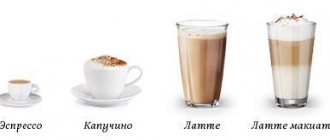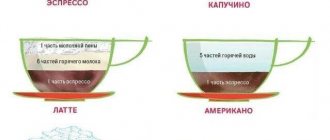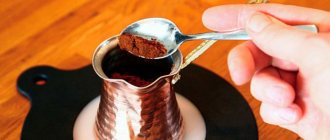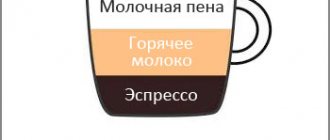Several years ago, a reform of the Russian language took place in our country, which caused considerable controversy. It was after her that it became possible to use the word coffee in the neuter gender. But adherents of the old school do not take this change seriously, and still do not get tired of correcting those who, in their opinion, speak incorrectly. Yes, you can argue endlessly about what kind of word coffee is. But it’s better to immediately figure out which is actually correct – “he” or “it”.
Information from history
In Russia, coffee has been known since the 17th century, when a doctor prescribed this drink to Tsar Alexei Mikhailovich as a cure for “arrogance, runny nose and headaches.” It began to be used as a tasty drink under Peter I, after the emperor became addicted to it in Amsterdam. Returning from abroad, in 1718 he issued a decree that guests should be served not only tea, but also treated to a new invigorating drink at assemblies and in the Kunstkamera.
In 1718, Peter I issued a decree ordering that, along with tea, guests should be served a new invigorating drink - coffee.
During the times of the Russian Empire, in addition to the word “coffee”, they also used “coffee” or “coffee”. Writer N.S. Leskov, in his work “Pabubniks” of 1885, writes both options, but for the Russian author they have different shades. “Kofiy” serves to convey village speech.
Forms that end in -y ceased to be the linguistic norm at the end of the 18th century. They are perceived as ignorant and vernacular. The main option remains “coffee”.
coffee
coffee
COFFEE is not inclined. coffee plant, its beans and a drink made from them. Coffea arabica. Swedish coffee, plant. Astragalus boeticus. Rye coffee. chicory, carrot, etc. burned from these substances, instead of coffee, coffee , related to coffee. - infusion, - smell, - color, dark brown, dark brown, the color of boiled coffee. Coffee house, coffee shop an establishment that sells brewed coffee and snacks. pot , a container of various types, for brewing coffee. || Hunter drinking coffee. Coffee house a tin or other container with a lid for storing burnt and sometimes ground coffee. || Lover of this drink. || A fortune teller using coffee grounds. Coffee shop , drink coffee. Coffee shop m. the court rank of caretaker for coffee, tea, chocolate, etc. who, at the court, goes for hot food.
Source: Explanatory Dictionary of the Living Great Russian Language on Gufo.me
Meanings in other dictionaries
- coffee - uncl., m. 1. A tropical tree or shrub, from the seeds of which a special drink is prepared; a coffee tree. 2. collected The seeds (grains) of this tree. Roasted coffee. Grind coffee. Small academic dictionary
- coffee - noun, m., s., used. often 1. Coffee is the beans of the coffee tree. Roasted coffee. | Do you just need coffee? | Grind coffee. | Do you have coffee beans or ground? 2. Coffee is a powder made from the beans of the coffee tree. Dmitriev's Explanatory Dictionary
- coffee - Borrowed in the middle of the 17th century. from English lang., where coffee < Arab. qahwe "coffee", Ethiopian contamination. Kaffa - the proper name of the place where coffee “came from”, and the Arabic consonant with it. qahwe "wine". Shansky Etymological Dictionary
- coffee - Coffee, uncl., m. and s. (grain and drink). Morphemic-spelling dictionary
- coffee - K'OFE, uncl., male kofi (colloquial) Wed. (from Arabic kahva - wine, from the name of the country in Africa - Kaffa). Beans of a tropical plant - the coffee tree. Coffee beans. Ground coffee. Roasted coffee. Ushakov's Explanatory Dictionary
- coffee - Neskl., m. and (obsolete) coffee, coffee (colloquial) Wed. [from Arabic kahva – wine, from the name of the country in Africa – Kaffa]. Beans of a tropical plant - the coffee tree. Coffee beans. Ground coffee. Roasted coffee. Large dictionary of foreign words
- COFFEE - (from Arabic qahwa) - ..1) the same as the coffee tree...2) A product obtained by roasting and grinding the seeds (grains) of the coffee tree. Contains caffeine, sugars, minerals, nitrogenous and other substances. Large encyclopedic dictionary
- coffee - This borrowing from English (coffee) appeared in Rus' along with the product itself in the 18th century, and goes back to the Arabic qahwa, which was probably formed from the proper name of the country where this plant was grown - Kaffa. Krylov's etymological dictionary
- coffee - spelling coffee, uncl., m. and (colloquial) s. Lopatin's spelling dictionary
- coffee - *** (drink) Coffee is prepared differently in different countries, but there are several international varieties of the drink that you will be served in any hotel in the world. Cafe o le is a drink consisting of equal parts of hot milk and coffee. Culinary dictionary
- coffee - COFFEE unchanged; m. [Gol. coffie from Arabic] 1. A tropical tree or shrub, with reddish berries, the pulp of which contains two seeds; a coffee tree. 2. collected The seeds (grains) of this tree, from which a tonic drink is prepared. Kuznetsov's Explanatory Dictionary
- Coffee - (English coffee, Dutch koffie, from Arabic kahwa) 1) the same as Coffee tree. 2) The seeds of the coffee tree (coffee beans, or grains), used to prepare the tonic drink known by the same name, and to obtain caffeine from them. Great Soviet Encyclopedia
- coffee - several coffees m. 1. A tropical tree or shrub, from the seeds of which a tonic drink is prepared; a coffee tree. 2. Seeds - grains - of such a tree. Explanatory Dictionary by Efremova
- Coffee - Or Coffee (Coffea L.) is a genus of plants from the madder family (see). Shrubs or small trees. The leaves are arranged in opposite pairs or in threes, leathery, perennial or herbaceous, entire, equipped with stipules. Encyclopedic Dictionary of Brockhaus and Efron
- coffee - coffee is also coffee (for example, by L. Tolstoy), for the first time coffee, 1724, Orb. sea; see Smirnov 164. From English. coffee or goll. koffie – the same (=kófi); see Severs, KZ 54, 47; Convert I, 372. The source of European words is Arabic. qahwa; see Max Vasmer's Etymological Dictionary
- coffee - COFFEE, uncl., m. 1. Grains (seeds) of the coffee tree. K. in grains. Ground k. 2. A drink made from such ground grains, as well as a surrogate for such a drink. Drink K. Natural K. K. with chicory. Acorn, barley. Color with milk (light brown, beige). Ozhegov's Explanatory Dictionary
- coffee - Tea and coffee (colloquially, disapproved) - drinking tea, drinking coffee as an idle pastime. ► You like to drink tea and coffee. Volkova's Phraseological Dictionary
- Blog
- Jerzy Lec
- Contacts
- Terms of use
© 2005—2021 Gufo.me
The meaning of the word "coffee"
There are several assumptions about where this word came from, but this is still not known for certain.
The Arabic word for a type of wine is qahwah; in Turkish - kahve, which could become the ancestor of the word “coffee”. Perhaps the name of the aromatic drink was given by the Ethiopian region of Kaffa, which is the birthplace of the coffee tree. In Kaffe itself, coffee is called “buno”. Wikipedia reports that in Europe the name of this aromatic drink was the Dutch word koffie, which in 1598 came into English as coffee.
In Russian explanatory dictionaries there are several meanings of the term, for example:
- A plant that produces fruits and grains.
- Coffee beans.
- Ground powder from these grains.
- A drink based on coffee beans.
The birthplace of the coffee tree is the Ethiopian region of Kaffa.
What does the word "coffee" mean?
In modern Russian, this word has several meanings.
- Plant . Trees of the Rubiaceae genus, belonging to various varieties and species. All of them produce juicy fruits with large grains. They are referred to as “coffee trees.”
- Beans obtained by processing the fruits of the coffee tree. It is correct to say "beans or beans of coffee".
- Ground bean powder is ground coffee.
- The finished drink , which is obtained by brewing or infusing ground beans, is natural coffee.
- Extract from ground grains , on the basis of which instant drinks are prepared - instant coffee.
In all meanings, the word retains the masculine gender, singular number and invariability in cases.
How to speak correctly
According to the rules of the Russian language, units of speech ending with the letter -e belong to the neuter gender. However, for example, in the explanatory dictionaries of S. Ozhegov and V. Dahl, the noun “coffee” is classified as a masculine grammatical feature.
There is no clear answer why the name of the invigorating drink began to be used in the masculine gender.
Why has coffee always been classified as masculine?
It is believed that this drink was first mentioned in Russia in the neuter gender. From what moment it began to be used in men’s clothing is unknown. This may have happened under the influence of the elite, who sought to distinguish themselves and emphasize their status in speech: saying “my coffee” was an indicator of prestige.
There is also a version that at first they said “coffee” and “coffee” in the masculine gender, so this term began to be used in the same way. For example, “... you should drink your own coffee” (A. Chakovsky, “Blockade”, 1968) or “She waited until the valet put out the coffee and left” (L. Tolstoy, “War and Peace”, 1867-1869).
Nevertheless, there is no exact confirmation that these obsolete forms were the original ones and that the grammatical feature was fixed from them. According to the research of philologist M. Eliferova, in 1700-1800. the form “coffee” occurred 15 times, “coffee” 25 times, and the form “coffee” 84 times. It follows from this that already in the 18th century. the predominant option was the one well known to everyone.
Can it be used in the neuter gender?
Even before the beginning of the 2000s. in modern Russian, only the masculine gender was considered correct, and only in some dictionaries did colloquial speech allow the neuter gender. But already in 2009, according to the order of the Ministry of Education, it became possible to use this noun both in m.r. and in sr. r., i.e. since then, “delicious coffee” has ceased to be a colloquial option and an indicator of illiteracy.
Many people disagree with this decision and try to stick to only one form.
Masculine or neuter? Is it coffee or it?
For the most stubborn, let us repeat once again - the word “coffee” in literary Russian has a masculine gender.
The word is written and pronounced the same way, without changing in numbers, cases and genders.
Examples of incorrect use of the word "coffee"
— I made delicious coffee.
— I splashed myself with coffee.
— The coffee was bitter...
Examples of correct use of the word "coffee"
- One coffee, please!
— I have hot coffee.
— The coffee was strong...
From the history of the word “coffee”
In order to understand why exceptions to the rules were made for coffee, we should remember the history of the word.
Until the 17th-18th centuries, the word did not exist at all in Russian speech. It began to appear in use along with the spread of the drink, to which the reforms of Peter the Great gave mass consumption in Russia.
It is believed that we borrowed the English version of the word coffee or the Dutch koffie. The latter seems to be the most correct, because the Russian transliteration turned out to be closer to the Dutch one. In our country, the word was pronounced as coffee or coffee. So they said: “Give me a cup of coffee, my dear!”
In accordance with the rules of the Russian language, the word was classified as masculine. Over time, the last letter fell off. This is how the word “coffee” appeared in our language, which has a masculine gender and does not change in cases and numbers.
Has anything changed in Russian dictionaries?
New alternatives for the use of some words, their grammatical features, like “coffee”, appeared in 2009 in the “Big Phraseological Dictionary of the Russian Language”, “Spelling Dictionary of the Russian Language”, “Dictionary of Stresses of the Russian Language” and “Grammar Dictionary of the Russian Language: Word change." The authors added a second sign “cf. R." and removed the “colloquial” inscription.
Since then, the invigorating drink can be officially used in both genders, although the male one is considered the main one, and the middle one is considered additional.
Cafe, coffee, coffee and even coffee... He's mine
Coffee is not only a delicious drink, but also a unique example of how a deviation from the norms of the Russian language suddenly became a marker of literacy and education.
The word “coffee” entered our language in the 17th century and for a long time was used either in the neuter or in the masculine gender (kefa, kafa, kof, kofii) - this is normal for “newcomers” who have not yet mastered it. Especially those who speak different languages: in Arabic - qahwa, in English - сoffee, in Dutch - koffie, in German - kaffee, etc. In 1655, the court physician Samuel Collins, for example, prescribed Tsar Alexei Mikhailovich as medicines “… boiled coffee
, known by the Persians and Turks, and usually taken after lunch... a fair amount of medicine against arrogance, runny nose and headaches.”
Over time, the most common forms were “kofiy” and “coffee”, in the masculine gender. Firstly, because the word was pronounced this way by the Germans and Dutch, with whom Peter I and his entourage were friends, who quickly transferred coffee from the category of medicines to the category of “drinks”. And secondly... it’s all due to tea! By analogy, coffee began to transform.
“Should I have some tea or coffee?” - asked some lady, taking an example from the sovereign - an ardent fan of the strong drink. Naturally, this option firmly entered the vocabulary of courtiers, merchants and nobles.
Changes began to occur again in the 18th century, when everything “Parisian” became fashionable, and the word “coffee” began to be pronounced with the French pronunciation – café. In 1781, A.P. Sumarokov published his linguistic work “On Spelling”, where there is no “coffee”, but there is only one option - coffee
, in the masculine gender.
And Pushkin’s friend V.K. Kuchelbecker wrote in his diary in 1832: “...I brewed coffee myself and
almost found even greater pleasure it Among young people, the words “coffee” and “coffee” have become signs of illiteracy (don’t you notice the analogy with modern times?).
Declension by case
In Russian, this word is borrowed and refers to nouns denoting various substances (sugar, cream, blood, etc.), so it cannot be unambiguously classified as either singular or plural.
The word "coffee" is inflected the same way, regardless of meaning, case or number.
Usage examples:
- guests treated to (what?) coffee - TV. P.;
- wash the cup after (what?) coffee - R. p.;
- please make (what?) coffee - V. p.
Dictionaries indicate that this word will be declined in the same way, regardless of meaning, case and number.
Discussion continues
When in 2012 it was allowed to speak the word “coffee” as a neuter word, a fierce debate on this topic broke out among lovers of the Russian language. The people were divided into two camps - some argued that the word “coffee” is masculine - this has always been and will always be so, and there is no point in imposing on uneducated ignoramuses their vision of what kind of coffee. Another camp argued with this, arguing that according to all the laws of the Russian language, the word coffee is neuter and so it is simpler and there is no need to explain why we cannot say “coffee is mine,” but must say “coffee is mine.”
What kind of coffee?
For our part, we understand both the first and second groups of people, lovers of the Russian language. But I would like to say, as one famous scientist said: coffee is still masculine.
A foreign word - let it be what it was, and not mimic it into our dictionary under the guise of a Russian word. There's nothing for a stranger to do here. And in general, drinking coffee is harmful). Although very tasty. But, we repeat, it is quite possible to say about coffee that it is neuter.
In general, there are a lot of foreign words that have entered the Russian language; you can see what kind of words they are: chimpanzee, jury, penalty. This is also very interesting.
Additional Information
Today in the coffee industry there are many different types of brewing, serving and recipes for an invigorating drink.
However, not all correspond to the same gender, and some of them still do not have a fixed grammatical norm in Russian dictionaries.
In a cafe you must use:
- Americano - not in dictionaries, but is more often used by analogy with “coffee” in the m.r.
- Cappuccino - you can say in m.r. or cf. R.
- Latte - it is permissible to speak in both m.r. and sr. R.
- Macchiato - not fixed, presumably can be used in both m.r. and cf. R.
- Espresso - should be used in ml.
The use of the noun “coffee” is possible both in the masculine and in the neuter gender “coffee-on”; modern language norms allow both options. Everyone can decide for themselves which grammatical form to choose. However, few people know about the changes made more than 10 years ago, so “good coffee” may still be perceived by others as colloquial.
Morphological analysis of the word
The essence of this type of analysis is to study the word as a part of speech. To do this, you need to indicate its general grammatical meaning, morphological and syntactic features. All these characteristics can be constant or impermanent. When a part of speech is immutable, there are no inconstant properties.
Morphological analysis of the word “coffee”:
- noun;
- initial form – coffee (nominative case, singular);
- common noun, inanimate, masculine and neuter, zero declension;
- inconsistent characteristics - case and number - are absent;
- can be a different part of a sentence depending on the context.
The start of a dispute over a drink
About a hundred years ago, Vasily Ilyich Chernyshev, a Soviet philologist, drew attention to the contradictions associated with the drink, despite the fact that it was only the beginning of the twentieth century. The gender of the word coffee even then turned out to be an open question, despite the traditional form of the word “coffee” or “coffee” indicated in Wikipedia. They are both obsolete forms of the masculine name for the drink. But these words are not originally Russian, but borrowed and modified from the English “coffee” or the Dutch “koffie”, where the noble drink is used in the masculine gender. The exact country of borrowing is unknown. So what kind of word is coffee?
The aromatic drink has been known for a very long time
In general, history can hardly tell how to use this word correctly. Many languages have varied gender from masculine to neuter, and historically there have even been feminine forms. The earliest word known to modern linguists was found among the Arabs. They read it as “qahwa” and had a feminine gender, although originally it meant one of the varieties of wine. Some European languages took the word from Turkish, where “kahve” is exclusively neuter, which is why it stuck.
But in the Russian language, the first appearances of the drink in dictionaries date back to the eighteenth century (1762), and you can rely on them, without paying attention to various options from other languages. Therefore, in order to ensure the reliability of the history of coffee, a Russian language dictionary of any year of release can become the most reliable source. Still, coffee in Russian must comply with its traditions and official rules, without depending on the rules in other countries.
You might be interested in Coffee classification











